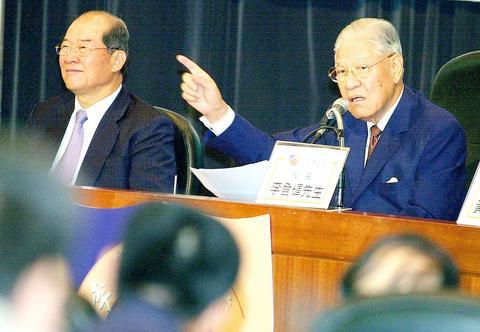Former president Lee Teng-hui (
Lee said that although President Chen Shui-bian (

PHOTO: LIAO CHENG-HUI, TAIPEI TIMES
"Some people still refuse to accept the results of the recount and even blame the national security mechanism for their loss. If they insist on casting blame like that, the election disputes probably won't be settled even in another four years. The people should really spit on them for their behavior," Lee said yesterday while addressing hundreds of students at the Lee Teng-hui School.
Lee said that the most important thing for the people and the administration now is to redouble their efforts, carry out reforms and push ahead with administrative affairs and legislative operations.
Analyzing the pan-blue camp's loss in the election, the former president said that the pan-blue alliance's defeat resulted from Chinese Nationalist Party (KMT) Chairman Lien Chan (連戰) and People First Party (PFP) Chairman James Soong (宋楚瑜) neglecting to appreciate the growth of Taiwan-centered consciousness. Lee said this failure led to the collapse of the KMT's party-state system and to the break-up of the KMT's control over its own network of supporters.
Lee said that efforts by many private social groups to promote Taiwanese national identity have helped bring about a situation in which 57 percent of the people in Taiwan, according to opinion polls, say that they identify with the notion of Taiwanese consciousness. However, Lee said that the goal is to boost that number to 75 percent within four years.
"Candidates in the next presidential election should endeavor to win at least 55 percent of the vote," Lee said.
Urging Hoklo (more commonly known as Taiwanese) members of the KMT to realize that their party is under the control of politicians who are outside the social mainstream, Lee said that ethnic Taiwanese people have remained a part of the KMT only because they have come to rely on certain benefits that they have received as a result of Mainlander leadership.
Lee said that the KMT's leaders have too much in common with the Beijing authorities and that they don't mind seeing Taiwan harmed if it suits their political interests.
Commenting on a plan that would lead to a merger between the KMT and the PFP, Lee said the plan is riddled with trickery and conspiracy and that it would silence the voices of pro-localization party members, many of whom are leery of the proposal.
Meanwhile, Lee yesterday repeated his dismissal of China's recent threats to "crush" moves toward Taiwan's independence "at any cost," saying the bellicose statements were only bluffing on China's part.
"Some reporters asked me whether I was afraid of the threats. I said there is nothing to fear because barking dogs don't bite. Those were just deceptive tricks by the Chinese," Lee said.
"Furthermore, the guidelines they issued on cross-strait relations were only issued by the very low-ranking Taiwan Affairs Office. If the threats really did come from [Chinese President] Hu Jintao (

Taiwan yesterday denied Chinese allegations that its military was behind a cyberattack on a technology company in Guangzhou, after city authorities issued warrants for 20 suspects. The Guangzhou Municipal Public Security Bureau earlier yesterday issued warrants for 20 people it identified as members of the Information, Communications and Electronic Force Command (ICEFCOM). The bureau alleged they were behind a May 20 cyberattack targeting the backend system of a self-service facility at the company. “ICEFCOM, under Taiwan’s ruling Democratic Progressive Party, directed the illegal attack,” the warrant says. The bureau placed a bounty of 10,000 yuan (US$1,392) on each of the 20 people named in

The High Court yesterday found a New Taipei City woman guilty of charges related to helping Beijing secure surrender agreements from military service members. Lee Huei-hsin (李慧馨) was sentenced to six years and eight months in prison for breaching the National Security Act (國家安全法), making illegal compacts with government employees and bribery, the court said. The verdict is final. Lee, the manager of a temple in the city’s Lujhou District (蘆洲), was accused of arranging for eight service members to make surrender pledges to the Chinese People’s Liberation Army in exchange for money, the court said. The pledges, which required them to provide identification

Nine retired generals from Taiwan, Japan and the US have been invited to participate in a tabletop exercise hosted by the Taipei School of Economics and Political Science Foundation tomorrow and Wednesday that simulates a potential Chinese invasion of Taiwan in 2030, the foundation said yesterday. The five retired Taiwanese generals would include retired admiral Lee Hsi-min (李喜明), joined by retired US Navy admiral Michael Mullen and former chief of staff of the Japan Self-Defense Forces general Shigeru Iwasaki, it said. The simulation aims to offer strategic insights into regional security and peace in the Taiwan Strait, it added. Foundation chair Huang Huang-hsiung

’DISTORTION’: Beijing’s assertion that the US agreed with its position on Taiwan is a recurring tactic it uses to falsely reinforce its sovereignty claims, MOFA said The Ministry of Foreign Affairs (MOFA) yesterday said Chinese state media deliberately distorted Taiwan’s sovereign status, following reports that US President Donald Trump agreed to uphold the “one China” policy in a phone call with Chinese President Xi Jinping (習近平). During the more than one-hour-long call, Xi urged Trump to retreat from trade measures that roiled the global economy and cautioned him against threatening steps on Taiwan, a Chinese government summary of the call said. China’s official Xinhua news agency quoted Xi as saying that the US should handle the Taiwan issue cautiously and avoid the two countries being drawn into dangerous